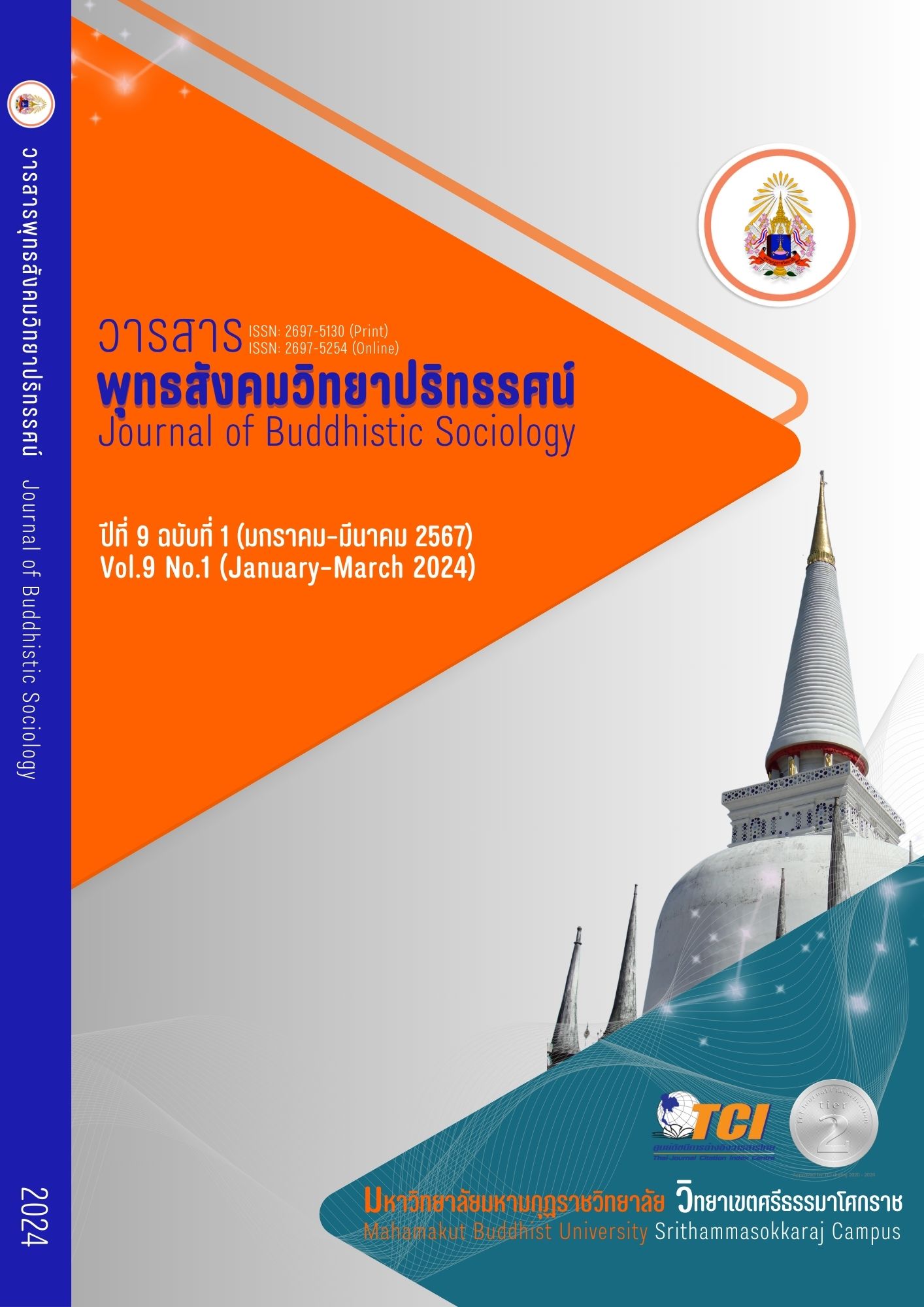GUIDELINES FOR DEVELOPING TEACHERS' POTENTIAL IN THE 21ST CENTURY ACCORDING TO THE FOUR VUDDHIDHAMMAS OF SCHOOLS UNDER THE NONTHABURI SECONDARY EDUCATION SERVICE AREA OFFICE
Main Article Content
Abstract
This research aimed to 1) study the condition of teacher potential in the 21st century in schools under the Nonthaburi Secondary Educational Service Area Office, 2) study methods for developing and raising the potential of teachers in the 21st century under four principles of Vuddhidhammas, and 3) propose ways to develop and raise the potential of teachers in the 21st century under four principles of Vuddhidhammas. This research was a mixed methods research. The data for quantitative research were collected by questionnaires, while for qualitative research, the data were collected through interviews. The population included 356 administrators and teachers from schools under the Nonthaburi Secondary Educational Service Area Office, and 181 individuals were selected as the sample group. Administrators of Wat Khemaphiratharam School, Sribunyanon School, and Rattanathibet School, totaling 5 people, were the key informants who gave the data through interviews. Statistics used in the research were frequency, percentage, mean, and standard deviation.
The research showed that:
- Overall, teacher potential conditions in the 21st century in schools under the Nonthaburi Secondary Educational Service Area Office were high (
=4.36).
- Overall, methods for developing and upgrading the potential of teachers in the 21st century under the four principles of Vuddhidhammas in three aspects were at a high level (
=4.38).
- Guidelines for developing and upgrading the potential of teachers in the 21st century under the four principles of Vuddhidhammas were as follows: Teachers must learn new teaching methods to fit with the situation by joining a PLC with a group of good friends. Then, they should apply the advice for self-development. Knowledge training was required to support teachers in creating information media and presenting their experiences. Teachers should be good role models based on moral principles and ethics and be friendly to students. They should also guide the students in the correct way of living life so that they have reasons to solve personal and public problems, including encouraging students to take responsibility for themselves and society.
Article Details

This work is licensed under a Creative Commons Attribution-NonCommercial-NoDerivatives 4.0 International License.
References
กระทรวงศึกษาธิการ. (2551). หลักสูตรแกนกลางการศึกษาขั้นพื้นฐาน พุทธศักราช 2551 (พิมพ์ครั้งที่ 3). กรุงเทพมหานคร: โรงพิมพ์ชุมนุมสหกรณ์การเกษตรแห่งประเทศไทย จำกัด.
ณัฐิกานต์ ปังศรีวงศ์. (2563). การพัฒนาทักษะด้านการใช้เทคโนโลยีสารสนเทศและการสื่อสารเพื่อการจัดการเรียนรู้ในศตวรรษที่ 21 ของครูโรงเรียนตลาดหนองหวาย สังกัดสำนักงานเขตพื้นที่การศึกษาประถมศึกษาสุราษฎร์ธานี เขต 2. ใน การศึกษาอิสระครุศาสตรมหาบัณฑิต สาขาวิชาการบริหารการศึกษา. มหาวิทยาลัยราชภัฏสุราษฎร์ธานี.
บันเย็น เพ็งกระจ่าง. (2561). การพัฒนาครูด้านการเรียนการสอนในศตวรรษที่ 21 ของโรงเรียนสารสาสน์วิเทศ คลองหลวง สังกัดสำนักงานคณะกรรมการส่งเสริมการศึกษาเอกชน. ใน การค้นคว้าอิสระศึกษาศาสตรมหาบัณฑิต สาขาวิชาการบริหารการศึกษา. มหาวิทยาลัยเกริก.
ภัทรวดี จำใบรัตน์. (2563). การพัฒนาครูโดยใช้กระบวนการชุมชนการเรียนรู้ทางวิชาชีพเพื่อส่งเสริมความสามารถจัดการเรียนรู้ตามแนวสะเต็มศึกษาของโรงเรียนอนุบาลสวี (บ้านนาโพธิ์) จังหวัดชุมพร. ใน การค้นคว้าอิสระครุศาสตรมหาบัณฑิต สาขาวิชาการบริหารการศึกษา. มหาวิทยาลัยราชภัฏสุราษฎร์ธานี.
รัชนี ศรีทับทิม. (2562). การบริหารจัดการโรงเรียนวิถีพุทธของโรงเรียนวัดเฉลิมพระเกียรติ พิบูลบำรุง. ใน การค้นคว้าอิสระศึกษาศาสตรมหาบัณฑิต สาขาวิชาการบริหารการศึกษา. มหาวิทยาลัยศิลปากร.
วิจารณ์ พานิช. (2556). วิถีสร้างการเรียนรู้เพื่อศิษย์ (พิมพ์ครั้งที่ 3). กรุงเทพมหานคร: ตถาตา พับลิเคชั่น.
วิโรจน์ สารรัตนะ. (2556). กระบวนการทัศน์ใหม่ทางการศึกษา กรณีทัศนะต่อการศึกษาศตวรรษที่ 21. กรุงเทพมหานคร: ทิพยวิสุทธิ์.
สายเพ็ญ บุญทองแก้ว. (2563). การพัฒนารูปแบบการบริหารสถานศึกษาเพื่อพัฒนาทักษะอาชีพ สำหรับนักเรียนในโรงเรียนสังกัดสำนักงานเขตพื้นที่การศึกษาประถมศึกษาสุราษฎร์ธานี เขต 2. ใน วิทยานิพนธ์ครุศาสตรมหาบัณฑิต สาขาวิชาการบริหารการศึกษา. มหาวิทยาลัยราชภัฏสุราษฎร์ธานี.
สำนักงานเขตพื้นที่การศึกษามัธยมศึกษานนทบุรี. (2556). ข้อมูลสารสนเทศ ปีการศึกษา 2565. เรียกใช้เมื่อ 20 กรกฎาคม 2565 จาก https://main.spmnonthaburi.go.th/o7/
สุนันท์ สังข์อ่อง. (2555). หลักสูตรและการสอนสำหรับศตวรรษที่ 21. เรียกใช้เมื่อ 2565 กรกฎาคม 2565 จาก https://www.gotoknow.org.
อนุชา โสมาบุตร. (2560). แนวคิดการจัดการเรียนรู้สำหรับครูในศตวรรษที่ 21. เรียกใช้เมื่อ 20 กรกฎาคม 2565 จาก https://teacherweekly.wordpress.com>.
Krejcie R. V. & Morgan D. W. (1970). Determining Sample Size for Research Activities. Educational and Psychological Measurement, 30(3), 607-610.


